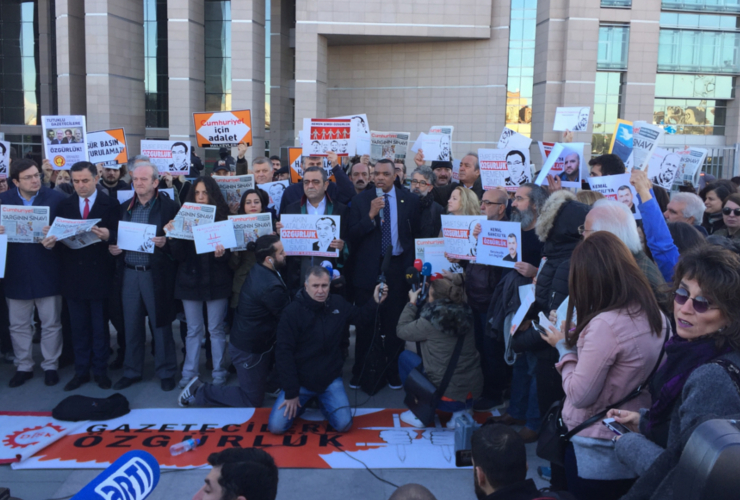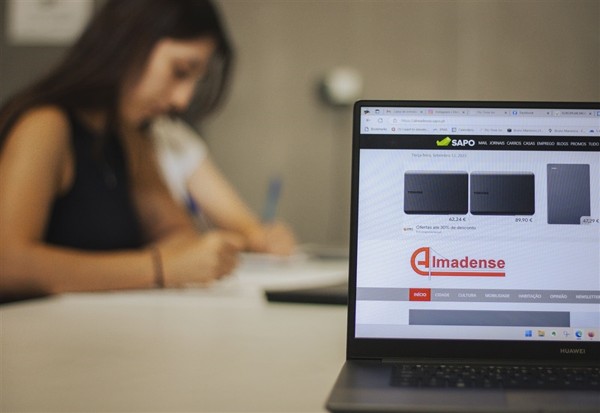International Press Institute (IPI) Executive Board Chair John Yearwood was in Istanbul on Oct. 31 as part of ongoing IPI efforts to monitor trial proceedings in the criminal case targeting independent daily newspaper Cumhuriyet and 18 of its current and former journalists and administrators on accusations that the paper’s reporting lent support to terrorists. Eleven were ordered held in pre-trial detention in late 2016 and another staff member joined them behind bars in April, the same month that prosecutors finally issued an indictment in the case. A court ordered eight of the defendants released in July and September, but four others remain behind bars, including Cumhuriyet Editor-in-Chief Murat Sabuncu and investigative journalist Ahmet Sik, who are both IPI members.
The op-ed below was originally published in the Miami Herald on Nov. 13, 2017, and is reprinted here with the permission of the Miami Herald.
ISTANBUL — The packed courtroom held its collective breath as the three judges returned to their seats after an hour-long dinner break. It had been almost eight hours since the hearing began for the four journalists and executives from the Cumhuriyet independent daily. They were among 17 employees arrested a year earlier and formally accused months later of supporting terrorists and violating their managerial duties to the newspaper.
Many in the steamy courtroom expected some or all of the remaining four staffers to be released after a daylong hearing that left observers bewildered. First, an expert testified that one of the defendants did not knowingly download a secret app popular with supporters of the outlawed cleric Fethullah Gülen, as prosecutors alleged. Gülen, who lives in Pennsylvania, has been blamed for the July 2016 coup attempt that left more than 265 people dead and led to a massive government crackdown against a wide swath of dissenters in Turkey, including journalists.
Even the lead judge appeared swayed by the expert witness, saying that his testimony was “very valuable” and could help courts better understand the complexities of social media. He seemed prepared to make a ruling on whether to free the journalists, but prosecutors then dropped a bombshell: The judge said the court received WhatsApp texts earlier in the day of a conversation about financial troubles at Cumhuriyet between recently arrested businessman Osman Kavala and Cumhuriyet columnist Aydin Engin, who’s facing terrorism charges. Another text, the judge said, showed Kavala and Cumhuriyet editor-in-chief Can Dundar agreeing to meet in Berlin. Observers in the courtroom groaned. It was difficult to determine the texts’ significance to the case.
Defendants and their attorneys vehemently objected to admitting the texts, with one attorney speaking for almost two hours. A dinner break was declared.
There was some hope that the three judges were swayed by some of the arguments. Indeed, in a September hearing, the judges released Kadri Gursel, Cumhuriyet’s columnist and, perhaps, the most well-known journalist arrested in the crackdown.
After dinner, the judges returned to the bench as more than 100 family members, friends, supporters, and international observers waited with anticipation.
Ten minutes later, it was over. The defendants will be returned to prison and another hearing scheduled for Christmas Day — to hear evidence about the WhatsApp messages. There would be no releases today.
And so it goes for the independent media in Turkey, a country with some 150 journalists in prison, more than any other nation in the world. The situation is so dire for journalists here that international organizations and institutions from Strasbourg to New York are investigating.
Numerous press-freedom and human-rights organizations have criticized Turkey, saying in a recent statement that it’s “difficult to dismiss arguments that this case is another politically motivated effort to criminalize journalism.
“We’re alarmed that it appears to be grounded on a theory equating journalism with violent extremism.”
Even journalist organizations inside the country have gone out on a limb to blast the government for its heavy-handedness in seeking to squash all opposing views in the media.
The government is not only jailing journalists in unprecedented numbers, local journalists say, but it’s also denying many the coveted yellow press cards critical to doing their jobs.
“Journalists are subjected to many pressures and are suffering a lot,” Turgay Olcayto, president of the Journalists Association of Turkey, told me. “There is one-man rule in Turkey. This rule shapes the media environment. They want an obedient type of journalist.”
That sentiment was clear after sitting in the courtroom for eight hours. The evidence against the journalists appeared weak, and prosecutors were playing for time as they maneuvered to delay the case.
Turkey’s treatment of journalists and human-rights defenders has cast a huge shadow over this country. It’s quickly gained a reputation as the leading jailer of journalists and for repressing the rights of its people. The four Cumhuriyet journalists should be released immediately — and not have to wait until the uncertainty of a Christmas Day hearing.
No one doubts that Turkey faces security challenges. But dealing with those challenges by cracking down on the rights of its citizens diminishes a great nation in the eyes of the world. That should be clear to everyone, including President Recep Tayyip Erdoğan.



